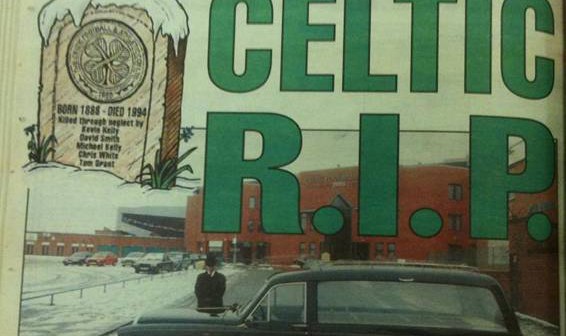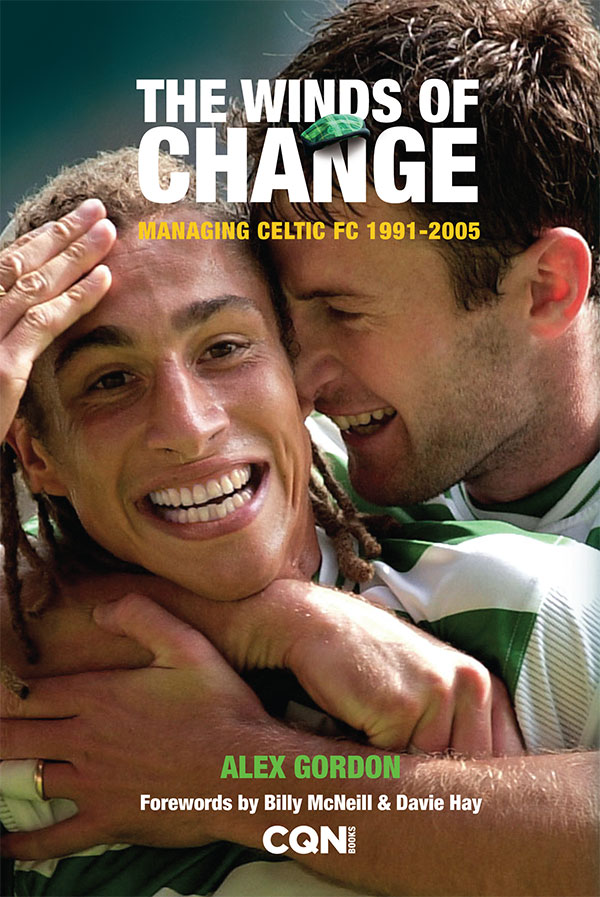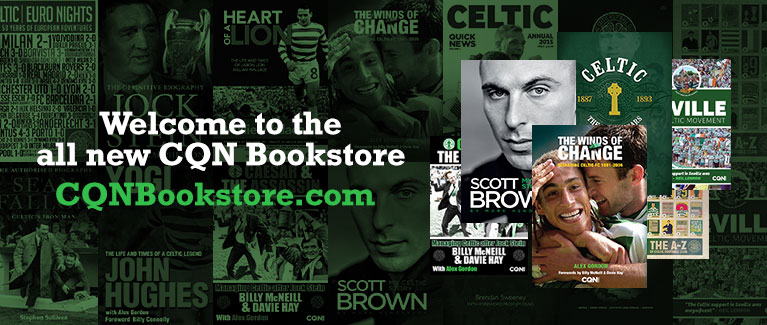THE WINDS OF CHANGE Managing Celtic FC 1991-2005 is the explosive new book published this week by CQN.
In part 2 of our interview with author Alex Gordon, a former Sports Editor at the Sunday Mail, we can reveal for the first time the story behind that newspaper’s decision to send a hearse to Celtic Park. We find out how this was planned for weeks, with Alex point blank refusing to allow it on his back page and how he was so disgusted that he left the job after more than two decades. With him out the door the story duly appeared and Celtic supporters’ relationship with that paper would never be the same again.
Alex never hid his affection for Celtic but that was not the reason why he objected to the hearse stunt and felt so strongly he that he left his job.
As a professional journalist he realised it was the wrong thing to do. An agenda driven gimmick had no place on the back page of the country’s biggest selling newspaper. How Ironic then that Celtic recovered, strengthened and prevailed and this happened to the club supported by the guy who’s idea it was to book the Celtic Park hearse…that bitch karma!
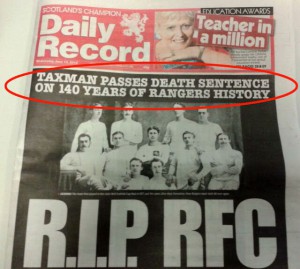
THE WINDS OF CHANGE is the follow-up to the best-selling Caesar and the Assassin, last year’s book from CQN about the Celtic managerial careers of two club legends, Billy McNeill and Davie Hay.
In THE WINDS OF CHANGE, Alex Gordon takes up the thread of the story with Liam Brady replacing Caesar in the Hoops hot-seat in 1991. We take a remarkable journey all the way through to Martin O’Neill’s last season in 2005. In between, of course, there were the periods of Lou Macari, Tommy Burns, Wim Jansen, Jozef Venglos, John Barnes and Kenny Dalglish.
So, be prepared for a rumbustious, rollicking trip through a truly incredible period in the history of Celtic Football Club before and after the arrival of Fergus McCann.
Earlier this week we published part 1 of an interview we did with Alex Gordon. If you missed it you can check it out HERE. It’s well worth a read! Below is the second part of a very interesting feature. You can order THE WINDS OF CHANGE and also Caesar& The Assassin if you haven’t read it yet, from the new look CQN Bookstore HERE.
MEET THE AUTHOR…part 2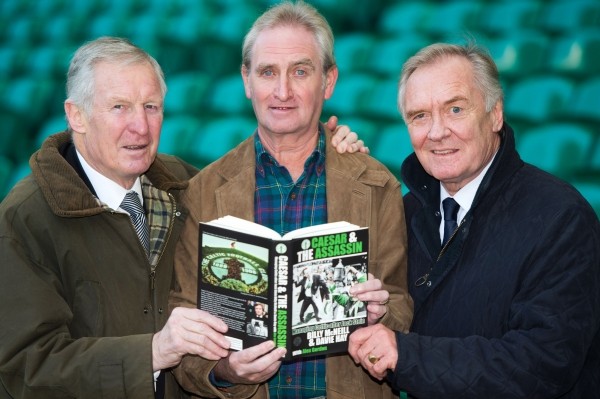

In THE WINDS OF CHANGE were you able to draw on ‘inside’ information from your days as a journalist when writing the book?
Yes, of course. There was so much over the years I accepted was privileged information and, as such, I felt duty-bound to keep it quiet until the time was exactly right and everyone agreed it was okay to be made public. For instance, transfers are naturally tricky things – even more so these days with agents, lawyers etc getting involved to get the best deal for their clients. And, of course, these transfers between clubs don’t always go as planned and no manager wants to be placed in an embarrassing position if the jigsaw falls apart at the last minute.
Can you give us an example?
I know Davie Hay won’t mind me divulging this one. I was working as the Sports Editor at the Sunday Mail on a Saturday night and was satisfied the first edition had come out on time and we were selling on the streets of Glasgow around eight o’clock. I could now concentrate on the later newspapers that took us through Scotland, targeting areas such as Aberdeen, Dundee and Edinburgh, until we arrived back in the early hours with the final edition selling in the city centre. I was always looking for an exclusive tale for later editions where we sold the bulk of the newspapers in the West of Scotland. I received a phone call from a valuable and excellent source informing me Davie Hay was attempting to buy Roy Aitken for St.Mirren. Davie, of course, was the manager of the Paisley club at the time, back in 1991.
That was the year after Aitken left Celtic for Newcastle United?
Correct. The tip-off made a lot of sense in so many ways. I knew Davie was a massive fan of Roy’s all-action style, plus his obvious inspirational on-field leadership qualities, and there was continued talk of the player not enjoying his time in English football – especially after participating in so much success with Celtic in his fourteen years at the club. Now, as you might expect, a lot of football managers frown upon being telephoned at home on a Saturday night. I could name a few who didn’t like being phoned at all! Davie, I knew, was different. I put the call in and Davie answered. I told him about the information I had just received. Davie could have stonewalled me, of course. There’s the old joke: “How do you know a football manager is lying? His lips are moving.” I trusted Davie and, thankfully, the feeling was reciprocated. I was told the transfer was at a “delicate” stage and could be blown if I went public with the story. Previously, I had worked on the Daily Record where you could “sit” on a story for twenty-four hours and take the chance it wouldn’t surface elsewhere. It’s an entirely different situation on a Sunday newspaper, when, of course, you face an agonising week hoping the story isn’t blown over the next six days in a daily paper. Davie understood the situation. He asked me to phone him back in an hour and he would try to speed things along at his end. Whatever happened in those sixty minutes, the Celtic legend managed to use his powers of persuasion to edge the deal closer to completion and I was given the go-ahead to run the story.
Back to THE WINDS OF CHANGE, Alex. Any stories like that in this book?
I don’t want to spoil it for the reader – but there was one where I was actively involved in a player joining Celtic. Originally, the individual made contact with me at a chance meeting and told me he wanted to go to Celtic. He was coming out of contract at his club and wasn’t happy. He was a big fan of Celtic and he asked me to do him a turn and drop his name in the ear of the Celtic manager. I did the guy a favour and, after about four or five months of hush-hush meetings and clandestine phone calls, he got his wish. His identity is revealed in the book!
So, we’ve established that back then there was a mutual trust between managers and certain newspaper individuals. Do you think that’s the case today?
I’m sure there are friendships, but I couldn’t be certain if the bond is anywhere near as strong as it was in my day. I left the Sunday Mail in February 1994 and a lot has changed since then. In my time, I do know managers, footballers, chairmen and directors weren’t afraid to “let their hair down”, to use a quaint expression, when they were in the company of newspapermen and we were out socialising. Remember, that was long before mobile phone cameras. I shudder to think what might have surfaced. No, there seemed to be more of a camaraderie back in my day. The newspapers still got stories, but we didn’t need to wreck personal relationships and friendships to achieve it. By the way, I would like to take the opportunity of setting a record straight, if I may?
The floor is yours…
After twenty-seven years, I left the Sunday Mail on February 8 1994. I think I had done my stint on the editorial floor. There was a lot of friction in the industry at the time, but, if you don’t mind, I won’t dwell on that – it would take far too much time. Suffice to say, decisions were being made with which I couldn’t agree. I knew there was talk of someone hiring a hearse and an undertaker and placing them outside Celtic Park on a matchday. I thought it was cheap, crass, vulgar and insensitive. Obviously, I wanted nothing to do with it. I believed then – and I still do – the media, in its many forms, must react responsibly. They can’t act on whims and delve into grey areas. They have a clear duty to stick to black-and-white facts. Sadly, though, nineteen days after I left, I wasn’t one bit surprised to see the thoughtless and offensive snap on the back page of my old newspaper. It had the headline ‘R.I.P. CELTIC’ on top of it. Twenty-one years is a short time for football fans with elongated memory banks and, unfortunately, it still gets mentioned today. So, please, let me take the opportunity of saying it had absolutely nothing to do with me. If I make a mistake, I’ll hold up my hands and accept the blame. I was very much a FORMER Sports Editor when that decision was made. Actually, David from CQN nails that fact in an editorial at the beginning of the book to remove all doubt.
Were there times when the Celtic supporters were less than enamoured with the newspaper when you were in charge?
Over such a prolonged period of time, you are never going to satisfy everyone. Sad fact of life. When Celtic were going through the barren period at the end of Big Billy’s second reign and the three seasons of Liam Brady and Lou Macari, things were rocky, to say the least. Some fans, just a shade anxious, adopted the “scattergun” approach to criticism and everyone was a target. I didn’t mind that, really. You take on a job where you realise criticism is going to be inevitable, so you just get on with it. I recall phoning Liam on the Saturday when Celtic had just got knocked out of the Scottish Cup 2-0 by a distinctly-average Falkirk side at Brockville in February 1993. I told him the report would be extremely severe and questions would be asked. Like a professional, he took as I thought he would and said: “Do your job, Alex.” And then he added: “We were awful!” Others didn’t take it quite so well.
We asked you the question in Part One about your favourite-ever Celtic player and you managed to dodge it! Here’s another – were there any players who didn’t make it you thought were certainties to hit the big-time?
Two immediately come to mind. One is Brian McLaughlin – not to be confused with the player of the same name who won a Scottish Cup medal with Tommy Burns’ side in 1995. The other is Tony McBride. I’ll take Tony first. I went to school with Tony at St Margaret Mary’s in Castlemilk and, if I’m being honest, he was an absolute tearaway. Actually, that’s an extremely kind way of putting it! But the boy could play, no doubt about it. I saw him performing for Scotland Under-15s against their English counterparts in 1967 and Tony tore them apart. He was unstoppable, but that was Tony; he knew no fear and strutting his stuff at Old Trafford in front almost 50,000 fans would have meant as much to him as playing on one of Glasgow’s infamous black ash pitches in front of two men and a dog. Tony masterminded a victory that afternoon and every big club in Britain wanted him. Manchester United manager Sir Matt Busby even made a personal visit to our sprawling Glasgow housing estate, but there was no way Tony was going to sign for anyone else but Celtic. Paul John Dykes covers Tony fairly extensively in his superb tome ‘The Quality Street Gang’ and explains the demons that drove Tony along the inevitable path of football destruction. But, trust me, Tony McBride was blessed with genuine football talent.
And what makes Brian McLaughlin stick in your mind?
I remember it was Davie Hay who first mentioned the name. Davie is such a laidback guy that sometimes you wonder if he possesses a pulse. So, when he got excited and raved about this young lad who had been training with Celtic, I knew he had to be special. I believe Brian was about seventeen years old when I first saw him and what struck me immediately was his poise and composure on the ball. He just looked so comfortable and didn’t look out of place playing alongside the likes of Hay, McNeill, Dalglish and McGrain. He had an exceptionally graceful running style and had the confidence to attempt some outrageous tricks and flicks. And then a defender went straight through him and, alas, a career at the highest level ended there and then. I don’t think he even played ten games for the first team. The poor lad passed away after a dreadful accident in 2009 at the far-too-young age of fifty-four. Tragic.
Last question, is there anything else you want to say about THE WINDS OF CHANGE, Alex?
You might expect me to say this, but I genuinely believe it is CQN’s best book yet. I was proud of ‘Caesar and the Assassin’ – a tribute to two of my favourite people – but I believe, because there are more subjects to cover in THE WINDS OF CHANGE, that I have unearthed a wealth of new material. One amazing thing is the difference in the varied personalities of the eight managers. They all had contrasting outlooks on how Celtic should play. For instance, you could never match up the managerial styles of Martin O’Neill and John Barnes. And, yet, there was only a year between them getting the boss’ job at Celtic. The fans were suddenly viewing something completely different from what they had witnessed the previous season. I believe that takes the book into new territories and keeps it ticking over. I hope so, anyway. I also hope the Celtic fans enjoy it as much as I enjoyed writing it.
THE WINDS OF CHANGE is available to order now for immediate delivery from the new look CQN Bookstore HERE or click on the image above.

